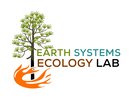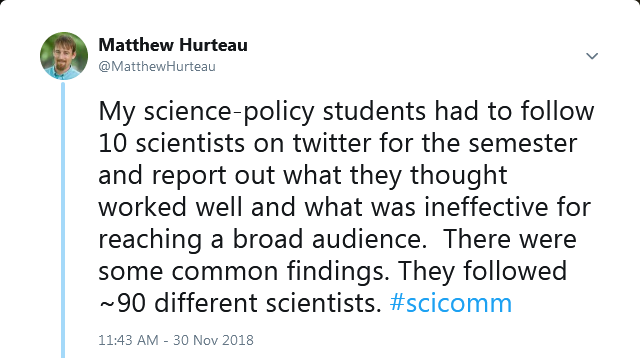|
This blog post is in response to all of the interest in the Twitter post I made about my student’s opinions regarding science communication on Twitter. About my course My course is called science-policy and it is focused on how to effectively engage as a scientist in the decision-making process. We spend the first third of the class discussing different philosophies behind engagement and the roles that scientists can play in the process. The middle third is a mix of case studies (e.g. Northwest Forest Plan, experimental flooding in the Grand Canyon, etc) and guest visits from congressional staffers. The final third is focused on effective communication. This involves writing research briefs, giving short presentations, and the elevator speech. I like to experiment with a different assignment each year and see how it works. I make them worth a very small fraction of the course grade in case they are a flop. I ask the students at the end what they thought of the assignment and it either evolves or is eliminated. This year I had them follow ten scientists on Twitter for the semester and report three things they thought worked well for communicating science and three things they thought did not work well. I tweeted the common ones out because I thought they were interesting and the one-off ones that made me chuckle while grading. These are absolutely the opinions of my students. They did not get any more guidance than I stated above. Stats on the scientists they followed Total = 82 (20 female, 62 male, 17 early career) The fields of expertise were diverse and ranged from psychology to neuroscience to space to climate to ecology and many more. 58 are at academic institutions and the balance is a mix of government, NGO, and independent Location: US 65; UK 9, Canada 4, 1 each in Spain, Portugal, Germany, Australia Stats on number of followers: Max 13M; Q3 77,400; Median 9,557; Q1 945; Min 195 Three of the early career (< Assistant Professor) had more followers than the median Probably the thing that caused the most consternation within the twitterverse was that scientists are people too and many tweet personal stuff as well. Drum roll please… Exactly 4 of the 58 had anything “personal” in their description and only 2 stated that this was their personal account. Unpacking “politics not science” Given the character limitation, I boiled down something nuanced to three words. Unfortunately, this yielded statements about my students being biased, privileged, and entitled. I found the privileged and entitled comment so preposterous that I shared it with my colleagues and we all got a laugh. No one has ever described students at our university as privileged and entitled. What that three word summary represented was the fact that students who mentioned politics very much appreciated when scientists brought their expertise to the discussion about a politically hot-button topic such as climate change. They thought folks like Katharine Hayhoe did a fantastic job of communicating the science, addressing the policy context, and answering questions. What they found ineffective was when scientists mixed their political views on stuff unrelated to their research in with their tweets about science. Note: Katharine Hayhoe was listed as an example of a top-notch science communicator by several students. This also happens to be my opinion. My Opinion The tweet summary represents the opinions of my students. I tweeted the common ones out because I found them interesting. The wonderful thing about the First Amendment is that if you are a US-based scientist you’re entitled to tweet out whatever you want. Non-science audiences are as diverse as the people who do science professionally. If you take anything away from this very limited survey of my students it should be this: If you want to effectively communicate your science, figure out what audience you are trying to reach and tailor your approach to that audience. You may turn some others off, but if you’re reaching your intended audience, who cares. I work on forests, fire, and climate change. My intended audience is policy-makers and natural resource managers. Some other folks, that don’t fall into those groups, appreciate the information I share. I dabble on Twitter, but that is not my primary tool for communicating science with my intended audience. I’m always happy to answer anyone’s questions, as long as they are respectful. Take what you want from this and leave the rest. If you use a similar exercise and find something that improves on what I did, please share it. If you’re put off by my student’s opinions, I recommend you do some self-reflection to figure out why you are all twisted-up over the opinions of a group of young people you’ve never met who haven’t singled you out in some way. My personal opinion is that my expertise on feedbacks between forests, fire, and climate doesn’t make me an expert on any other topic. Thus, my opinion on another topic isn’t any more valid than anyone else’s. Any comments require my approval and I am pretty bad about paying attention to the notifications.
0 Comments
|
Details
Archives
October 2023
Categories
All
|





 RSS Feed
RSS Feed